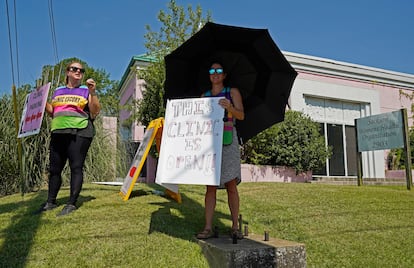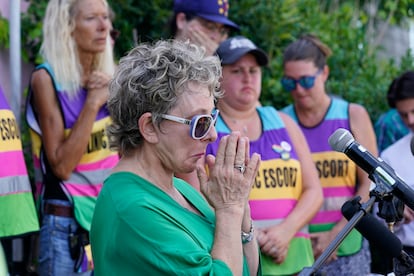Inside the Mississippi abortion clinic that triggered Supreme Court ruling: ‘Everyone who kills babies deserves to die’
The Jackson Women’s Health Organization lost its case against the state, with the justices ruling to overturn ‘Roe vs Wade.’ The center, which has been targeted by pro-life protesters, must now close its doors. But it plans to reopen in New Mexico


The Jackson Women’s Health Organization is known in the capital of Mississippi as the Pink House. Its fame reached new heights on Friday after it lost a Supreme Court against the state of Mississippi over its 2018 law that banned nearly all abortions after 15 weeks of pregnancy. In a 6-3 ruling, the conservative-led court overturned Roe v. Wade, the landmark ruling that established the constitutional right to abortion in 1973.
The news – while expected – still came as a shock to Diane Derzis, the 68-year-old owner of the Jackson Women’s Health Organization, who says she does not intend to give up. “Women have always had abortions. It has been an honor and a privilege to be here,” she said outside the clinic, before revealing that she plans to continue operating at the Pink House for 10 more days and then open a new clinic in Las Cruces, New Mexico, 1,600 kilometers (373 miles) from Jackson. Derzis, who has been providing reproductive health services to women for 46 years, intends to continue serving Mississippi patients at the new center.
Not long ago, Mississippi was considered a refuge state for women who wanted to abort. It is now one of 13 (along with Arkansas, Kentucky, Louisiana, Missouri, the two Dakotas, Oklahoma, Wyoming, Texas, Tennessee, Idaho and Utah) that has a trigger law ready to go into effect in the next few days. Up until now, abortions could be carried out until the 15th week of pregnancy, or later if the pregnancy was the result of rape or if the life of the mother was at risk. With the end of Roe vs. Wade, one of the most restrictive abortion laws in the country is expected to come into force in the state.
“A lot of people don’t know what’s going on. They do not know that this judicial decision is an abuse of a fundamental right,” said activist Kim Gibson, co-founder of Pink House Defenders, which shields patients who arrive at the Casa Rosa from the religious fanatics who protest outside the clinic with grotesque posters of bloody fetuses and try to humiliate the women. Gibson has been doing this since 2017.
—”Do not put the most beautiful gift that our savior gave you in murderous hands. Repent!” a large man in a camouflage cap yelled at a woman.
―”If you really believe that murders are being committed in there, why don’t you call 911 and tell the police?” one of the escorts from the clinic asked him.
The Pink House is located in Fondren, a progressive neighborhood in Jackson. In the 1980s, Mississippi was home to more than a dozen clinics. But today Jackson Women’s Health Organization is the only one left. Since 2014, there have been no other centers of this kind in the state, which has high poverty levels. It is located on a corner, on a small hill, on a street where the traditional businesses, such as the shoe store and a locksmith, sit side by side with modern ships such as a vinyl store, tiki cocktail bars and a neighborhood cinema.
The private clinic treats about 300 patients per week. Many are poor and receive support from foundations and organizations to pay for the abortion. The number of women seeking help from the Pink House started to rise last December after Texas banned abortions after six weeks of pregnancy, amounting to a total ban on abortion. This pushed many women to travel hundreds of miles for treatment.
The Pink House Defenders make a shorter but also difficult path with the patients, the one between their cars and the center. They carry wireless speakers blasting music to drown out the prayers of the fanatics. Derenda Hancock, another of the founders of the advocacy group, is armed with pepper spray.
On Friday, after the ruling, tempers heated up at the gates of the Casa Rosa. “Everyone who kills babies deserves to die. You’re lucky that murderers are spared in this country, Kim,” Gabe Oliva, 30, yelled at Gibson from across the sidewalk.
The south of the United States, especially the region known as the Bible Belt, is home to a very active pro-life movement. One of the first activists to flock to the doors of Jackson Woman’s Health Clinic when it opened in 1995 was Roy McMillan, who terrorized doctors, nurses and patients alike. “I don’t find it a sin to kill someone who is fixing to exterminate children,” he said at the time. A judge banned McMillian from coming within 15 meters of any abortion clinic. One of his companions on the pro-life crusade, the minister Paul Hill, had killed a doctor and his escort with a shotgun a year earlier, in 1994, in the state of Florida. He was sentenced to death, and executed by lethal injection in 2016.
But the harassment continues. On Thursday, a man outside the Pink House was holding up a sign with the name of one of the gynecologists at the clinic. “Bruce Norman kills babies here,” the message read. Abuse like this, together with very strict abortion rules in the state, have prompted the clinic to fly in its medical team once a week from other states. The doctors are put up in safe houses. “People don’t want to work where they live,” explains Derenda Hancock, who says some radicals followed doctors and nurses home. “They just won’t leave them alone.”

Doctors have come up against many barriers from the state Republican party, which in 2011 launched a ballot to confer the legal definition of “personhood” to fertilized eggs. The initiative failed, but in the following decade, and thanks to ultra-conservative Governor Phil Bryant, new restrictions were approved. For example, patients in Mississippi have to receive state-facilitated counseling designed to change their minds. After the session, they must wait 24 hours, forcing them to make two trips to the clinic. Minors must get their parent’s permission in order to abort. The clinic is required to perform ultrasounds on patients and offer them the option of viewing the image.
“This does not end with abortion. Now they will go after birth control. And then in vitro fertilization, although it will be harder to ban it because it is a process used by the rich. It is the return to a theocratic state,” said Hancock after the defeat.
Derzis, the owner of Jackson Women’s Health Organization, often talks about her experience with having an abortion at 12 weeks. She was a college student and married. She has no regrets even though she describes it as an unpleasant experience. Sometime later, she divorced. She opened her first clinic in the 1970s. One of her centers, in Birmingham, Alabama, where she lives, a three-and-a-half-hour drive from Jackson, was the target of a bomb attack in 1998. The main suspect in that attack was the terrorist Eric Rudolph, who was later identified by the FBI as being responsible for the bomb at the Atlanta 1996 Olympic Games. The clinic was rebuilt, but it was forced to close in 2012 due to health regulation violations. That year, she also launched a lawsuit against a Mississippi law, which required doctors at her clinic to have residency in a local hospital in order to perform abortions.
In 2018, she returned to court again to fight the state’s restrictive abortion law – a case known as Dobbs vs Jackson Women’s Health Organization. This case ended on Friday with the conservative justices overturning the landmark Roe vs. Wade precedent. Derzis will now move her clinic to New Mexico. The old Pink House saw the end of Roe’s legacy. The new one will open its doors at the dawn of the Dobbs era.
Tu suscripción se está usando en otro dispositivo
¿Quieres añadir otro usuario a tu suscripción?
Si continúas leyendo en este dispositivo, no se podrá leer en el otro.
FlechaTu suscripción se está usando en otro dispositivo y solo puedes acceder a EL PAÍS desde un dispositivo a la vez.
Si quieres compartir tu cuenta, cambia tu suscripción a la modalidad Premium, así podrás añadir otro usuario. Cada uno accederá con su propia cuenta de email, lo que os permitirá personalizar vuestra experiencia en EL PAÍS.
¿Tienes una suscripción de empresa? Accede aquí para contratar más cuentas.
En el caso de no saber quién está usando tu cuenta, te recomendamos cambiar tu contraseña aquí.
Si decides continuar compartiendo tu cuenta, este mensaje se mostrará en tu dispositivo y en el de la otra persona que está usando tu cuenta de forma indefinida, afectando a tu experiencia de lectura. Puedes consultar aquí los términos y condiciones de la suscripción digital.








































